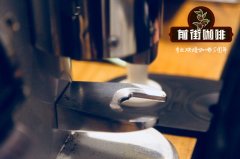The coffee grounds we threw away after we finished our coffee are so useful?
Professional coffee knowledge exchange more coffee bean information please follow the coffee workshop (Wechat official account cafe_style)

In China, thousands of cups of coffee are made every day, and at the same time, countless coffee grounds are produced.
Everyone likes the strong aroma of coffee and enjoys the richness of coffee, but few people pay attention to the pile of coffee grounds that have been squeezed dry.
In China, the situation of coffee grounds is also considerable.
In 2016, the number of cafes across the country exceeded 100000. According to incomplete statistics, there are more than 6000 coffee shops in Shanghai alone, producing at least 24-30 tons of coffee grounds every day, not including coffee waste generated by individuals at home or in companies. This trend is also growing at an alarming rate of 15%. How can we promote the resource utilization of coffee grounds, turn waste into treasure, and gain great value in sustainable utilization? There are already various projects to transform coffee grounds around the world.
In the UK, Bio-Bean has been turning thousands of tons of coffee grounds into biofuels since 2014. CEO Arthur Kay, then 25, said they collected the remaining coffee grounds in coffee shops, restaurants, companies, train stations and shopping malls in London every day. The average Londoner drinks 2.3cups of coffee a day, or at least 70 million cups of coffee is consumed. As a result, more than 200000 tons of garbage and 500000 tons of coffee grounds are produced each year. Bio-bean will first send the coffee grounds to the factory for processing, and then the extracted coffee oil will be sent to the biofuel plant, where animal and vegetable fuel oils will be added to make a mixture of 80% conventional diesel and 20% biofuel.
Using this mixed fuel not only eliminates the need to retrofit the engine or other costs, but also reduces the bus's carbon emissions by 10% to 15%. On November 20, 2017, some British street buses officially began to use the fuel made from coffee grounds.
If you are a coffee lover and often make your own coffee, you might as well collect and make good use of your daily coffee grounds, just remember to dry or dry before using it. In case of emergency, it can be dried in a microwave oven or oven, otherwise it is easy to get moldy.
Coffee grounds have many small pores, which can absorb moisture and eliminate odors, so dry coffee grounds can be placed in shoe cabinets, refrigerators or toilets for dehumidification and deodorization. In addition, the sun-dried coffee grounds spread on the ashtray, not only easier to extinguish the cigarette butts, but also reduce the smell of smoke!
Coffee grounds contain about 2% nitride, which can convert organic matter into fertilizer, which is a safe and environmentally friendly fertilizer. However, it should be noted that it is more suitable for plants that need acidic soil, but not for all plants.
Important Notice :
前街咖啡 FrontStreet Coffee has moved to new addredd:
FrontStreet Coffee Address: 315,Donghua East Road,GuangZhou
Tel:020 38364473
- Prev

Have you had your coffee? Have you ever tasted scented tea with coffee flowers?
Professional coffee knowledge exchange more coffee bean information please follow the coffee workshop (Wechat official account cafe_style) Coffee flowers can be divided into three main ingredients: pollen, nectar and petals. Pollen is rich in proteins, amino acids, carbohydrates, saturated and unsaturated fats, flavonoids and carotenoids. Nectar contains sugars (glucose, fructose and sucrose), amino acids, eggs
- Next

What coffee beans are used to make ice drop coffee | Front Street Coffee shares the blending idea of ice drop coffee!
Professional coffee knowledge exchange more coffee bean information please follow the coffee workshop (Wechat official account cafe_style) although it is autumn now, but! It is also very happy to have a cup of iced coffee in this weather ~ so the question comes, which beans should I choose for ice-drop coffee? Front street coffee is usually
Related
- Workers collapse! Lucky suspects that it will introduce freshly cut fruits?!
- 1-point subsidy recipients wear thousand-yuan watches?! Local response: For low-income households
- Can lightly roasted coffee beans be used to extract espresso? How finely should you grind high-quality coffee beans to make Italian latte?
- What is the difference between the world's top rose summer coffee and Yejia Shefi? What are the flavor characteristics of Yega Shefi coffee and Panama rose summer?
- The ceremony is full! Starbucks starts to cut the ribbon at a complimentary coffee station?!
- A whole Michelin meal?! Lucky launches the new "Small Butter Apple Crispy Latte"
- Three tips for adjusting espresso on rainy days! Quickly find the right water temperature, powder, and grinding ratio for espresso!
- How much hot water does it take to brew hanging ear coffee? How does it taste best? Can hot water from the water dispenser be used to make ear drip coffee?
- What grade does Jamaica Blue Mountain No. 1 coffee belong to and how to drink it better? What is the highest grade of Blue Mountain coffee for coffee aristocrats?
- What are the flavor characteristics of the world-famous coffee Blue Mountain No. 1 Golden Mantelin? What are the characteristics of deep-roasted bitter coffee?

